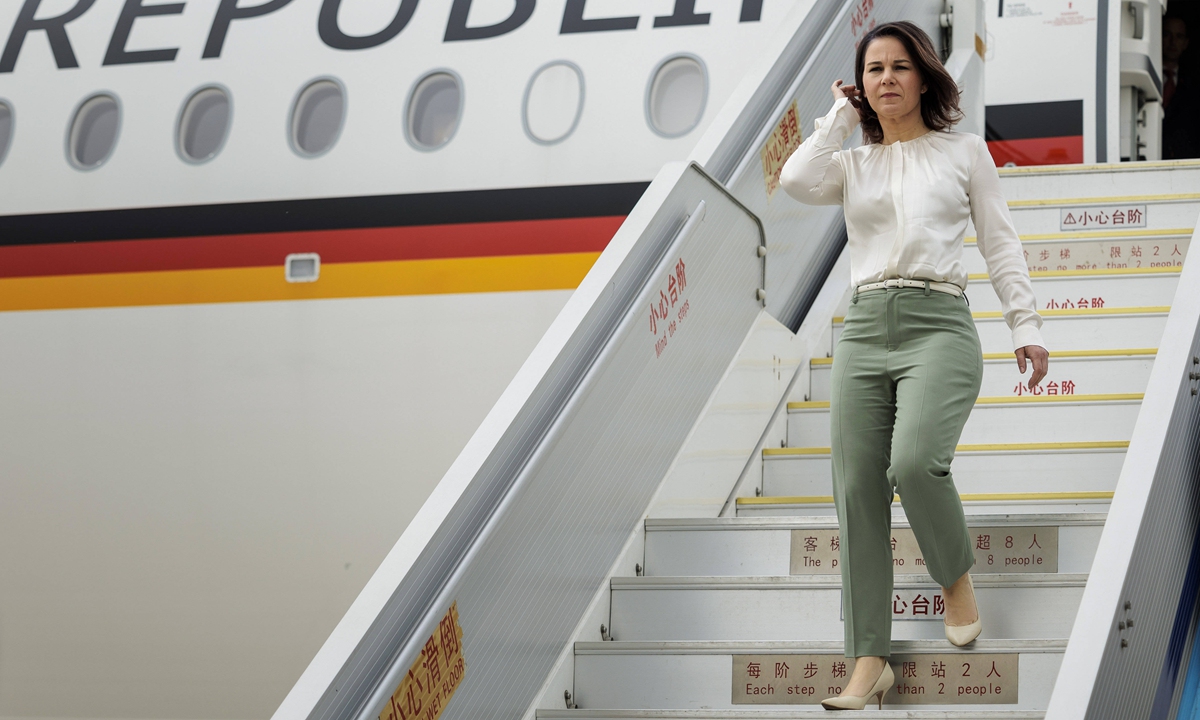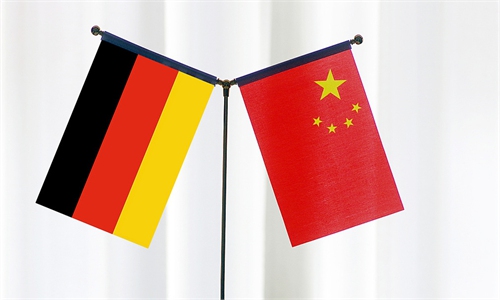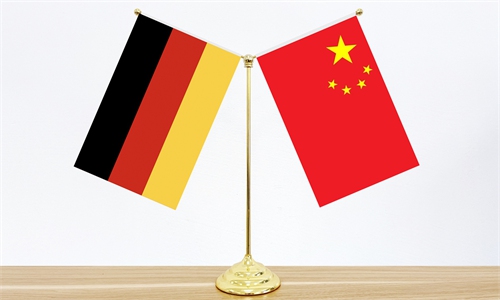Pragmatic cooperation instead of setting up barriers should be post-COVID trend for China-Germany ties: experts
Pragmatic cooperation instead of setting up barriers should be post-COVID trend for both sides: experts

German Foreign Minister Annalena Baerbock arrives in North China's Tianjin on April 13, 2023 to start her three-day China visit. Photo: VCG
As Germany has started to show signs of tightening its scrutiny of Chinese investment from telecommunications gear to major infrastructure projects, calls are on the rise among Chinese experts and officials for a fair business environment in the European economy, as the core part of the relationship with China is economic cooperation, and there is huge potential for bilateral ties in the post-COVID period.
The comments came after Germany's Interior Minister Nancy Faeser was quoted as saying on Sunday that the ministry is examining all Chinese components that are already installed in Germany's 5G networks.
The minister said that the move was intended to protect German communication networks, and the examination's three priorities were identifying risks, averting dangers and avoiding dependency, according to a Reuters report citing German national Sunday newspaper Bild am Sonntag.
The German government said in March that it was carrying out a review of telecommunications suppliers such as Chinese vendors Huawei and ZTE, whose equipment is used in Germany's 5G networks.
In Germany and most other European countries, Huawei remains one of the most important suppliers of 5G networks.
A report released by Danish firm Strand Consult showed that 59 percent of the components that made up Germany's 5G radio access network were supplied by Chinese vendors like Huawei.
An examination is not a ban. If the German government were to impose such a ban on Huawei, to follow the suit of the US, which has set extraordinary restrictions on the Chinese firm, it could result in huge costs that would be difficult for local operators to manage, according to Xiang Ligang, director-general of the Beijing-based Information Consumption Alliance.
It will be difficult for local operators in Germany to find high-quality, cost-effective replacements for Chinese products, Xiang said.
"In the field of telecommunications, the US has very little voice in the entire industry. In terms of chips, the US indeed controls many upstream technology patents, and it can wave a big stick behind a bunch of firms.
"But in Europe, the operators that Huawei cooperates with are relatively less affected by the US," Ma Jihua, a veteran technology analyst, told the Global Times.
The reported examination of Chinese 5G gear came three days after a Reuters report saying that Germany is reviewing its decision to allow China's COSCO to take a stake in one of logistics company HHLA's three terminals in Germany's largest port Hamburg, citing the German economy ministry.
In response, Wang Wenbin, a spokesperson for China's Foreign Ministry, urged Europe's largest economy to view bilateral practical cooperation in an objective and rational way.
"The German side is well aware of the background of the acquisition. It is hoped that the German side will not politicize, stretch security concerns and set barriers on normal business cooperation," Wang said.
The German government approved an investment by COSCO Shipping Ports for a 24.9 percent stake in HHLA's three terminals in Hamburg in October last year.
Cui Hongjian, director of the Department of European Studies at the China Institute of International Studies, told the Global Times that the EU has been tightening scrutiny of Chinese investment and adding political factors into bilateral normal economic cooperation in recent years, posing some challenges.
Political principles, instead of practical interests, have overwhelmed economic rules. As a result, the previous win-win China-EU ties based on mutual benefits have been dragged into a zero-sum mentality, Cui noted.
Although investment or industry cooperation, especially that related to so-called national security, is a difficult area for Chinese players in Europe to make near-term breakthroughs, experts called for cancelation of restrictions on Chinese firms.
Despite current challenges, China and Germany and the whole EU should seek pragmatic cooperation especially in the economic sector, Cui noted, adding that with the Chinese economy back on the recovery track in the post-COVID era, the huge market is becoming more appealing for European firms.
During German Foreign Minister Annalena Baerbock's recent visit to China from Thursday to Saturday, which was deemed as a first step to more dialogue that will help stabilize China-Germany ties, she said "We should de-risk our relations with China. It doesn't mean decoupling from China, but we must reduce one-sided dependencies."
Underscoring the necessity of "de-risking" instead of "decoupling" in the economic field indicated that the two sides should find more common ground and overlapping fields where both want to promote cooperation.
China was Germany's most important trading partner for the seventh year in a row in 2022, according to Germany's Federal Statistical Office (Destatis). Goods shipped from China increased by 33.6 percent year-on-year to 191.1 billion euros ($204.4 billion), while German exports to China rose by 3.1 percent to 106.8 billion euros.



